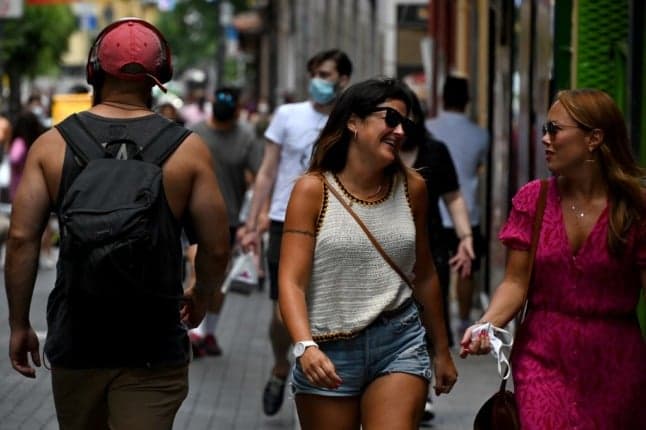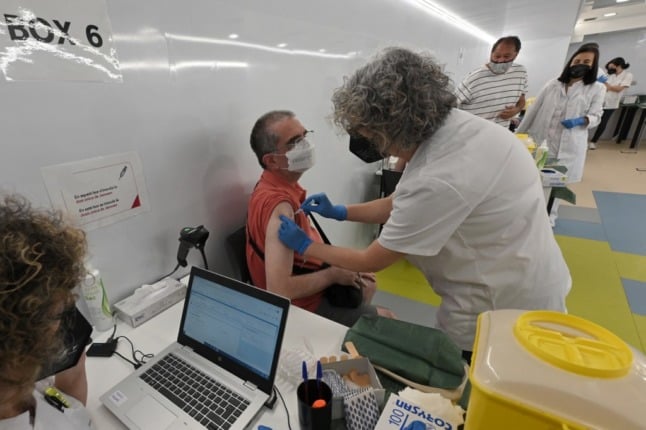Will there be a seventh wave of Covid-19 in Spain?

As Omicron cases drop in Spain, what do leading health experts in the country think the chances are that this sixth coronavirus wave will be the last?
Back in early November 2021, The Local Spain published an article asking whether there would be a sixth wave of the coronavirus in Spain.
The article was published before the arrival of the highly infectious Omicron variant, which explains why at the time there was a fairly optimistic attitude that the fifth wave would be the last, as Spain’s Health Minister Carolina Darias put it “the virus is (was) cornered”.
Prestigious medical publication The Lancet even went as far as running an article suggesting that Spain was very close to reaching herd immunity.
How quickly things changed once the Omicron strain arrived in Spain in late November 2021.
Cases spiked every day for weeks, beating daily infection records and reaching an infection rate among vaccinated and unvaccinated that was unprecedented.
In fact, around half of the more than 10 million Covid-19 infections Spain has had during the pandemic have occurred during this sixth wave.
Even though Spain’s high vaccination rate has helped keep the rate of hospitalisations and deaths from Covid lower than previous waves, the sheer number of cases has meant that there are still plenty of people suffering serious Covid symptoms or dying from the disease, most of whom are not vaccinated.

The rate of vaccination among Spain's adult population has stagnated at around 80 percent over the past two months, as has the inoculation rate among children since the Covid-19 jab was approved for them last December. Photo: Lluis Gené/AFP
Around seventy days since the arrival of the Omicron variant in Spain, the infection rate is now dropping considerably day by day - even though the incidence remains very high - leading many to believe that it won’t be long before Spain’s 47 million inhabitants can put the sixth wave behind them.
But what's next? Has Omicron’s rampant spread throughout Spain and the world meant that this sixth wave will be the last in the country? Do Spanish health experts believe there could be a seventh wave in Spain?
Will there be a seventh wave?
"A new wave may occur but it’s unlikely, at least before the summer,” Francisco Caamaño, doctor of Preventive Medicine and Public Health at the University of Santiago de Compostela, told ABC.
“And if it does occur, it would not be as intense as the sixth wave".
However, Caamaño acknowledged that “we cannot rule out the arrival of a more aggressive variant, which expands easily and therefore leads to more deaths”.
“In such a scenario, within two weeks we would have it in Spain as the transmission of a virus like this would be largely asymptomatic, which is very difficult to stop,” the health expert concluded.
Covid-19 mutations have occurred to a large extent in countries or areas where group immunity is low, which is why Spain’s Public Health specialists point out that they “will not be sure until we are all vaccinated”.
Although the full vaccination rate in Spain currently stands at around 80.9 percent and 48 percent of Spaniards have had a booster shot, only 54.2 percent of the world’s population, 4.23 billion people, have been fully vaccinated.
The vaccination rate in many African nations is still below 10 or even 5 percent, and the latest figures from our World in Data show a huge contrast in inoculation rates between developed and developing countries.
Rafael Bengoa, a former World Health Organisation (WHO) health systems director, also believes it will be "difficult for there to be a seventh wave, although there may be some outbreaks".

Healthcare workers help a Covid-19 patient to stand up with a medical machine, at Barcelona's Bellvitge Hospital ICU unit. Milder for most but still highly contagious, Omicron has again filled hospital beds at worrying levels during the sixth wave in Spain. (Photo by Josep LAGO / AFP)
“We have seen from the beginning that this pandemic is one of variants and mutations that are emerging frequently,” Bengoa, who is currently a director of the Institute for Health and Strategy in Bilbao, said.
“New waves have caught us off guard, the latest being Omicron. What is especially important about Omicron is that it is infecting many people, and as Spain has a very high vaccination rate, this makes it difficult for there to be more Covid-19 waves.”
With governments and populations worldwide desperate for an end to the pandemic, talks over when the virus might be reclassified have intensified.
Spain has stepped up and wants to lead an international push for Covid-19 to be monitored in a similar way to seasonal flu.
Bengoa agrees with this, but warns against doing it too soon. "If one begins to reason that Covid-19 is like the flu, people will lower their perception of risk and begin to remove their masks, not maintain social distance, etc," he argues.
"We can talk about comparing it to the flu when we are in a more stable and predictable situation, we are not in that situation yet."
READ MORE: Spain’s health experts divided over whether Covid-19 should be treated like flu
The general consensus among other epidemiologists in Spain is similar - another wave as serious as the sixth one is unlikely, but that doesn’t mean Covid-19 will disappear.
Joan Carles March, a professor at the Andalusian School of Public Health (EASP), agrees that "in all likelihood there will be future outbreaks", although he isn’t sure the situation will be serious enough for it to be referred to as a new Covid wave.
“Last August, I was sure that we would have a sixth wave as I saw that we were beginning an autumn in which we would spend more time indoors, which increases the risk of infection.”
Previous coronavirus waves in Spain have tended to develop during or directly after periods of increased social interactions such as Christmas.
There are other less optimistic health experts who believe that if there were to be another coronavirus wave in Spain, this could develop during Easter week in Spain, coming up in mid-April.
César Carballo, doctor at Madrid’s Ramón y Cajal Hospital told La Sexta TV channel in late January that "there are still 50 percent of people who haven’t been infected with Omicron yet" and that if politicians do nothing to remedy the situation, there will be a seventh wave by Semana Santa (Easter).
National and regional governments are in the process of easing restrictions currently, with the most notable change being the decision for face masks to no longer be mandatory outdoors.
“It’s what Einstein used to say, it’s madness to do the same thing over and over again and expect different results.”
Other practitioners are also sceptical. "There’s a sense that there is a retention of mutations, but this is unknown and we have no evidence that another variant may not exist and appear, one that can lead us to a seventh wave," Lorenzo Armenteros, spokesperson for Spain’s Society of General Practitioners, is quoted as saying by Andalusian daily Sur.
“There is one thing to highlight and that’s that Spain is one of the countries in the world that has had the most epidemiological waves, because different cultural factors and idiosyncrasies intervene.”
Comments
See Also
Back in early November 2021, The Local Spain published an article asking whether there would be a sixth wave of the coronavirus in Spain.
The article was published before the arrival of the highly infectious Omicron variant, which explains why at the time there was a fairly optimistic attitude that the fifth wave would be the last, as Spain’s Health Minister Carolina Darias put it “the virus is (was) cornered”.
Prestigious medical publication The Lancet even went as far as running an article suggesting that Spain was very close to reaching herd immunity.
How quickly things changed once the Omicron strain arrived in Spain in late November 2021.
Cases spiked every day for weeks, beating daily infection records and reaching an infection rate among vaccinated and unvaccinated that was unprecedented.
In fact, around half of the more than 10 million Covid-19 infections Spain has had during the pandemic have occurred during this sixth wave.
Even though Spain’s high vaccination rate has helped keep the rate of hospitalisations and deaths from Covid lower than previous waves, the sheer number of cases has meant that there are still plenty of people suffering serious Covid symptoms or dying from the disease, most of whom are not vaccinated.

Around seventy days since the arrival of the Omicron variant in Spain, the infection rate is now dropping considerably day by day - even though the incidence remains very high - leading many to believe that it won’t be long before Spain’s 47 million inhabitants can put the sixth wave behind them.
But what's next? Has Omicron’s rampant spread throughout Spain and the world meant that this sixth wave will be the last in the country? Do Spanish health experts believe there could be a seventh wave in Spain?
Will there be a seventh wave?
"A new wave may occur but it’s unlikely, at least before the summer,” Francisco Caamaño, doctor of Preventive Medicine and Public Health at the University of Santiago de Compostela, told ABC.
“And if it does occur, it would not be as intense as the sixth wave".
However, Caamaño acknowledged that “we cannot rule out the arrival of a more aggressive variant, which expands easily and therefore leads to more deaths”.
“In such a scenario, within two weeks we would have it in Spain as the transmission of a virus like this would be largely asymptomatic, which is very difficult to stop,” the health expert concluded.
Covid-19 mutations have occurred to a large extent in countries or areas where group immunity is low, which is why Spain’s Public Health specialists point out that they “will not be sure until we are all vaccinated”.
Although the full vaccination rate in Spain currently stands at around 80.9 percent and 48 percent of Spaniards have had a booster shot, only 54.2 percent of the world’s population, 4.23 billion people, have been fully vaccinated.
The vaccination rate in many African nations is still below 10 or even 5 percent, and the latest figures from our World in Data show a huge contrast in inoculation rates between developed and developing countries.
Rafael Bengoa, a former World Health Organisation (WHO) health systems director, also believes it will be "difficult for there to be a seventh wave, although there may be some outbreaks".

“We have seen from the beginning that this pandemic is one of variants and mutations that are emerging frequently,” Bengoa, who is currently a director of the Institute for Health and Strategy in Bilbao, said.
“New waves have caught us off guard, the latest being Omicron. What is especially important about Omicron is that it is infecting many people, and as Spain has a very high vaccination rate, this makes it difficult for there to be more Covid-19 waves.”
With governments and populations worldwide desperate for an end to the pandemic, talks over when the virus might be reclassified have intensified.
Spain has stepped up and wants to lead an international push for Covid-19 to be monitored in a similar way to seasonal flu.
Bengoa agrees with this, but warns against doing it too soon. "If one begins to reason that Covid-19 is like the flu, people will lower their perception of risk and begin to remove their masks, not maintain social distance, etc," he argues.
"We can talk about comparing it to the flu when we are in a more stable and predictable situation, we are not in that situation yet."
READ MORE: Spain’s health experts divided over whether Covid-19 should be treated like flu
The general consensus among other epidemiologists in Spain is similar - another wave as serious as the sixth one is unlikely, but that doesn’t mean Covid-19 will disappear.
Joan Carles March, a professor at the Andalusian School of Public Health (EASP), agrees that "in all likelihood there will be future outbreaks", although he isn’t sure the situation will be serious enough for it to be referred to as a new Covid wave.
“Last August, I was sure that we would have a sixth wave as I saw that we were beginning an autumn in which we would spend more time indoors, which increases the risk of infection.”
Previous coronavirus waves in Spain have tended to develop during or directly after periods of increased social interactions such as Christmas.
There are other less optimistic health experts who believe that if there were to be another coronavirus wave in Spain, this could develop during Easter week in Spain, coming up in mid-April.
César Carballo, doctor at Madrid’s Ramón y Cajal Hospital told La Sexta TV channel in late January that "there are still 50 percent of people who haven’t been infected with Omicron yet" and that if politicians do nothing to remedy the situation, there will be a seventh wave by Semana Santa (Easter).
National and regional governments are in the process of easing restrictions currently, with the most notable change being the decision for face masks to no longer be mandatory outdoors.
“It’s what Einstein used to say, it’s madness to do the same thing over and over again and expect different results.”
Other practitioners are also sceptical. "There’s a sense that there is a retention of mutations, but this is unknown and we have no evidence that another variant may not exist and appear, one that can lead us to a seventh wave," Lorenzo Armenteros, spokesperson for Spain’s Society of General Practitioners, is quoted as saying by Andalusian daily Sur.
“There is one thing to highlight and that’s that Spain is one of the countries in the world that has had the most epidemiological waves, because different cultural factors and idiosyncrasies intervene.”
Join the conversation in our comments section below. Share your own views and experience and if you have a question or suggestion for our journalists then email us at [email protected].
Please keep comments civil, constructive and on topic – and make sure to read our terms of use before getting involved.
Please log in here to leave a comment.